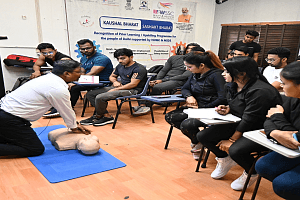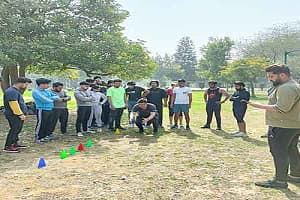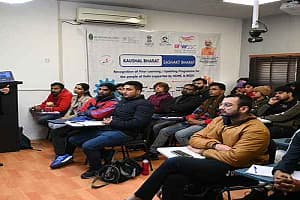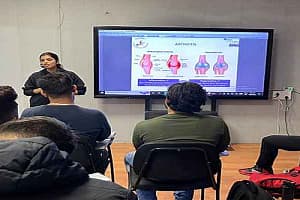Best Nutrition course in India [ Nutrition certifications ]
![Best Nutrition course in India [ Nutrition certifications ]](/_next/image?url=https%3A%2F%2Fapis.classicfitnessgroup.com%2Fmedia%2Fuploads%2Fblog_images%2Fs%2Fbest-nutrition-course-in-india-300-200.png&w=3840&q=75)
Fitness and nutrition are one of the growing industries that require certified professionals who have the right knowledge in the field. As people are getting more aware of potential health issues, chronic disorders, and metabolic disorders because of lifestyle, the requirement for certified and educated professionals is increasing. Diabetes and obesity leading to major health conditions have become a major concern worldwide and therefore, many students are looking forward to making a career in this field.
To be a certified Nutritionist or Dietician in India there are several types of courses available from different universities. Although, dietician or nutritionist both helps in achieving the fitness goal of a client yet there is a difference in being one of them.
The dietician is a certified professional who has done a long-term course and is very well known to treat medical conditions. On the other hand, a nutritionist is a professional who has done a short-term course and might not be able to treat medical conditions.
Several available courses in India certified you as a professional to improve your skill, which helps people to achieve their health and fitness goals. These courses are divided into short-term and long-term depending on the duration. Short term course includes
Certification: A certification course can vary from few hours to few weeks or few months. Specific certification courses focus on the specific type of skill development. Being in short duration major nutrition certifications cover basics and do not provide you depth knowledge.
Diploma: A diploma is a course that might be 6 months to a yearlong nutrition course. Some diploma includes internship or training period that helps a professional to gather experience. Diploma courses focus on providing practical knowledge of the subject by adding a duration of the experience. However, depth knowledge of nutrition and specialization is still missing from diploma courses.
Bachelors’ degree (Undergraduate): bachelor or graduation degree is a 3-to-4-year long degree course that provides you depth knowledge and can be done from an accredited university. Some degrees also have the provision for internship or training to combine theory and practical knowledge. Also, some universities provide an option of distance learning that can be self-paced. Bachelor’s degree gives you an idea about the depth of the subject so that you can choose your master’s degree or specialization accordingly.
Master’s degree (Post-graduation): Masters or post-graduation is the 2-year long degree that provides you the specialization of the subject. In nutrition there are different specializations include dietetics, food technology, public health, and food science. To get the specialization and to pass the degree, the student needs to have research work or thesis work done. This research work under a guide helps a professional to have specific experience in the specific field of nutrition. However, to get into a master’s degree you need to have a relevant bachelor’s degree, and similar to a bachelors’ degree, some universities provide an option of self-paced learning in an extended period of time.
Doctor of Philosophy (Ph.D.): It is the highest academic level awarded to an individual for their work on a specific topic of the field. Ph.D. students need to submit their original research work in the form of a thesis or dissertation that helps them to stand against the experts in the field. An individual who earned a Ph.D. degree can use Dr. as a prefix with their name, however, this can vary from country to country.
Before you decide which university, you want to join first choose the duration of time you want to invest in a course and about the last educational level passed. There are many national and international options available in India to pursue nutrition courses. Nutrition is a vast science field that has different subdivisions that provides information about different aspects of Nutrition, following are few options:
Clinical Nutrition: Clinical corresponds to nutritional interventions for patients suffering from a medical condition. It focuses on the prevention, diagnosis, and management of chronic diseases primarily in the health care setup. A clinical Nutritionist is a professional who needs to deal with different issues but not limited to just eating disorders, malnutrition, and lifestyle disorders.
Pediatric Nutrition: Pediatrics is a branch that looks into the requirement of infants, kids, and adolescents. Pediatric Nutritionist or dietician is a professional who takes care of the nutrition requirements of infants and kids as per the requirement and lifestyle. The weaning phase where an infant shift from mother’s milk to normal food is one of the most important phases in life, hence, a certified pediatric professional can help in planning meal preferences and choose the right nutrient-dense options.
Geriatric Nutrition: Geriatric is a branch which deals with issues and requirements of the elderly population, specifically above the age of 65 years. With aging nutrition, requirement changes majorly because of changes in metabolism, digestion, gut flora, hormonal responses, and cognitive functions. Hence, a certified professional need to work with issues but is not limited to less appetite, gastric reflux, chronic lifestyle disorders, indigestion, and hormonal imbalance.
Sports Nutrition: This specific branch of nutrition involves improving the athletic performance of an individual as per their sports requirement. Different sports based on their type, intensity, and duration require different nutrition, hence, a certified professional need to work as per the demand of the sports. Increased physical activity also leads to increased demand for different nutrients depending on gender and sports specificity. So, learning about sports nutrition gives you a chance to work with athletes to improve their performance.
Fitness Nutrition: Sedentary lifestyles have increased the risk of different lifestyle disorders including metabolic disorders, hormonal imbalance, gastric issues, chronically higher stress levels, and much more. Hence, fitness or wellness Nutrition focuses on improving the quality of life by working on lifestyle changes. Regular physical activity and eating a balanced diet as per the lifestyle is one of the main focuses in learning fitness or wellness nutrition.
Holistic Nutrition: Holistic Nutrition includes learning about considering an individual as a “whole” that includes body, mind, and soul. Hence, certified professionals focus on using food as a medicine instead of conventional medicine to heal or treat an individual. The holistic approach is all about adding nutrient-dense and balanced meals as per the lifestyle and requirements of an individual considering every aspect as a whole strategy.
Ayurvedic Nutrition: Ayurveda is a centuries-old concept that promotes your overall health and wellbeing by preventing illness and imbalance in the body. It is not a specific diet pattern but a lifestyle in itself where importance is given to right and balanced eating for healing because without the right nutrition medicine is of no use. Ayurveda is a concept that works as per the doshas (energy and primary element) of the body including Kapha (water + earth), Vata (air), and pitta (fire) to achieve the best health.
Looking into these available options as per your choice you can enroll under offline or online courses through an affiliated university. Although there are international courses also available specifically for sports, fitness, and holistic nutrition. Following are few national and international options that can provide you the nutrition course as per the choice:
-
ACE (American Council on Exercise): ACE is an international platform that provides you the specialist certification in Fitness Nutrition, Weight Management, Behavior changes, and Health Coach. If you are someone already working as a personal trainer or have been in the fitness industry, then, doing a specialist certification will provide you an extra edge. It is an online course with self-paced studying material which makes it easy to study in the comfort of your home.
-
ISSN (International Society of Sports Nutrition): It is a non-profit academy that works on implementing the research-based application of nutrition in sports. They provide certificate and diploma in sports nutrition that is inclined towards the understanding science-based approach for improving sports performance. They provide you a self-paced study material along with an online forum where you can read all the research studies as per the relevant topic.
-
SAI (Sports Authority of India): If you are looking for a degree rather than short-term certification in specifically sports nutrition, then, SAI provides you the option of certification to master’s degree as per your latest education and experience. They have online and offline options for courses where they have a specific batch starting dates. Hence, make sure to visit their website to know about the latest dates for the batch starting.
-
Delhi University: Delhi University provides you the option of doing graduation or post-graduation specifically in dietetics, food technology, home science, and nutrition. However, these are offline courses where you need to visit your college regularly for classes. The specific course looks towards technical and practical knowledge of the respective field. You can get admission there based on your latest education level.
-
IGNOU (Indira Gandhi National Open University): IGNOU as the name suggests is an open university that provides the certification, diploma, and degree all in the field of nutrition including child-specific or old age-specific. You might need to visit the college for practical or exams but the study material is all self-paced. However, they start batches at specific times during the year, hence, make sure to visit their website for more information on batch starting and exam dates.
The options of nutrition courses are not limited to just what is mentioned above but before joining any program make sure to check about the eligibility. Learning nutrition is all about learning the science behind the overall functioning and well-being of the human body, hence, make sure to choose your specialization as per your choice.






